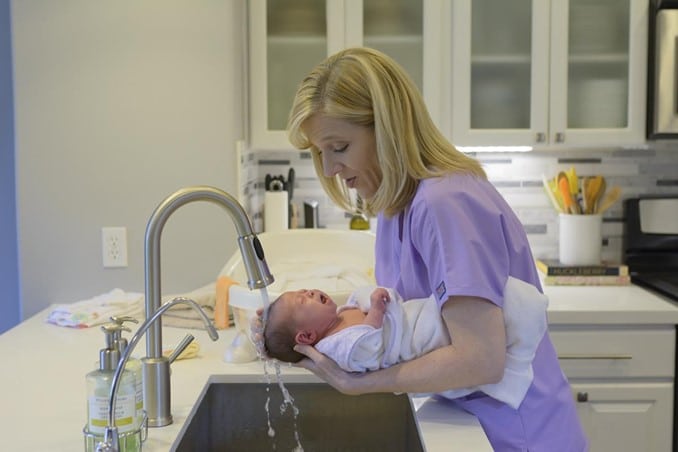Crying Baby 101: How to Successfully Manage Colic, Postpartum Depression, and The Basics of Newborn Care
One of the most challenging aspects of being a new parent is soothing a crying baby. This is a common issue faced by many parents and it is only natural to feel overwhelmed, frustrated, and even angry at times. There are distinct reasons why a baby might cry, and it is not always easy to determine the cause. Furthermore, it not only takes a toll on the moms but can also be detrimental to the baby’s health. Thus, in this article, we will explore some of the reasons why a baby cries and discuss how parents, especially mothers, can cope with this issue while keeping their mental and emotional well-being in check.
Why Do Babies Cry?
For newborns or month-old babies, crying is their only means of communication. They cry to express their needs, which then allows their parents to act on them. The following are the common reasons why babies cry:
Hunger
The most common reason babies cry is that they are hungry. A baby’s stomach is exceedingly small and can only hold a limited amount of milk. Thus, they need to be fed more frequently than adults do. If you think your baby is crying because they are hungry, try offering them breast milk or formula.
Wet Diaper
Another common reason babies cry is that they have a wet or soiled diaper. When a baby’s diaper is full, it can cause discomfort and even pain. To avoid this, make sure to check your baby’s diaper regularly and change it as soon as possible.
Discomfort
Apart from a full or wet diaper, babies may experience discomfort for other reasons related to their surroundings, which can include the following:
- Too much or too little clothing
- Blankets that are too heavy or light
- Room temperature that is too hot or cold
- Loud noises
Oftentimes, it is easy to trace the source of the discomfort and address it accordingly. For instance, if the room is too cold, you can add more blankets or clothing to keep your baby warm. But there are also times when the crying persists even no matter what you do. This is where colic comes in.
Colic
Johns Hopkins Medicine defines colic as a baby’s incessant and inconsolable crying that lasts for more than three hours a day and happens at least three days a week, for at least three weeks. It typically starts when the baby is around two to four weeks old and subsides by the time, they are four months old. The crying bouts often occur in the late afternoon or evening and can last up to several hours.
While the exact cause of colic remains unknown, experts believe that it might be due to the following:
- The baby’s digestive system is still maturing and is unable to properly digest milk or formula.
- The baby is sensitive to certain foods that the mother eats, which then passes through her breast milk.
- The baby is crying in response to painful gas.
- The baby is crying out of frustration because they cannot yet communicate their needs.
In most cases, colic goes away on its own and does not require any specific treatment. However, if the crying is causing significant distress to the baby or parents, then seeking help from a pediatrician or postpartum doula might be necessary.
Inability to Sleep
Another reason babies cry is that they cannot sleep. When babies get used to falling asleep in their mother’s arms or being rocked to sleep, it can be difficult for them to transition sleeping on their own. As a result, they might cry out of frustration or fear.
To help your baby sleep better, create a bedtime routine that they can follow every night. This might include a bath, reading a story, and singing a lullaby. You can also try putting your baby to sleep in their crib while they are still awake but drowsy, and gradually let them fall asleep on their own.
Tiredness
Babies can also become cranky and cry if they are tired. Crying is often a baby’s way of telling you that they need to sleep or that their current environment is too stimulating for them. If your baby is crying because they are tired, try putting them in a quiet room to sleep. You can also try rocking or nursing them to sleep.
What Happens to a Mom When a Baby Cries?
When dealing with infant crying behavior, it is also important for moms to recognize and process how their baby’s crying makes them feel. According to research discussed by TIME, a mother’s brain receives an infant’s cry as a highly important emotional signal. Oftentimes, a crying baby can trigger a feeling of intense distress in a mother, which can lead to anxiety, or in worse cases, postpartum depression.
Managing Postpartum Depression and Infant Crying Behavior
While dealing with a crying baby is a common challenge for all parents, it can be especially difficult for mothers who are struggling with postpartum depression. In these cases, it is important to seek help from a professional who can provide support and guidance.
What Is Postpartum Depression?
Postpartum depression or PPD is a type of affective disorder that is usually experienced by women within the first four to six weeks after giving birth (Postpartum Depression.org). It hinders a mother’s ability to function properly and can often cause her to feel overwhelmed, isolated, and sad.
Studies by the Centers for Disease Control and Prevention (CDC) have shown that there is at least 1 in every 8 women who experience postpartum depression (PPD). In the United States, the estimated figure for postpartum depression is about 1 out of every 5 women (CDC).
Symptoms of Postpartum Depression
Experiencing postpartum depression can be very isolating and scary. Hence, it is important for mothers to be able to identify the symptoms of this condition. Some common symptoms of PPD include the following:
- Feeling easily overwhelmed
- Not feeling motivated to do anything
- Feeling sad, anxious, or guilty all the time
- Having thoughts of harming oneself or the baby
- Having trouble bonding with the baby
- Feeling easily irritated with the baby’s crying
- Experiencing a decrease in energy
- Not being able to sleep or eat properly
While all these symptoms can be indicative of postpartum depression, it is important to note that every mother experiences PPD differently. Hence, not all these symptoms will necessarily be present in every case.
How Does an Infant’s Crying Behavior Affect Postpartum Depression?
As mentioned earlier, crying is one of the ways that an infant communicates their needs to their caregivers. However, for mothers who are suffering from postpartum depression or other mental health concerns, the crying of their baby can often be more distressing and triggering than for other mothers.
In fact, studies have shown that crying is one of the most reported causes of stress during the postpartum period. For mothers who are struggling with postpartum depression, hearing their crying baby can often lead to an increase in negative moods and thoughts and can exacerbate their condition.
Why Postpartum Doulas Are a Big Help with a Crying Baby
Whether you are starting to experience symptoms of postpartum depression or finding it extra hard to cope with your crying baby, seeking help from a postpartum doula can be beneficial.
Postpartum doulas are professionals who provide non-medical support to mothers and their families after childbirth. Because the transition from pregnancy to parenthood can often be challenging, a postpartum doula can provide both practical and emotional support to mothers during this time.
Some of the services that a postpartum doula might provide include the following:
- Assistance with breastfeeding and bottle-feeding
- Helping with light, baby-related tidying/organization, and laundry
- Providing emotional and educational support and guidance
- Preparing meals and snacks for mom
- Offering resources and referrals
- Helping the mother with postpartum recovery
If you feel like you are struggling to cope with your crying baby, postpartum doulas are one of the best resources that you can turn to for help. Apart from assisting you with your post-childbirth recovery, most of them are very experienced when it comes to soothing crying babies and can provide you with invaluable support and knowledge.
When To Ask for Help
As a parent, you would always want to put your baby’s needs first. However, it is important to remember that to be able to take care of your baby, you need to take care of yourself as well. Thus, whether it is the help of a postpartum doula, a babysitter, or a professional psychologist, you should never hesitate to ask for help when you feel like you need it. However, if you are still struggling to muster the courage to do so, here are some signs that you might need assistance:
You are Feeling Overwhelmed and Stressed Out All the Time
Oftentimes, this is due to the piles of laundry and dirty dishes that are constantly mounting up, plus the crying baby that just will not stop. Thus, hiring a nanny or a postpartum doula may do wonders in helping you feel more relaxed and less stressed out.
However, if these feelings persist even when your home is clean and the baby is calm, it might be indicative of a more severe problem such as postpartum depression.
You are Crying More Often Than Usual
Crying is a natural response to stress, and it is perfectly normal to shed a few tears every now and then, especially during the postpartum period. However, if you find yourself crying more often than usual, to the point where it is impacting your daily life, then it might be time to ask for help.
You Feel Like No One Understands What You are Going Through
Your parents, in-laws, and partner say that they are there for you, but somehow their words just do not seem to make you feel any better. If this is the case, it might be helpful to seek out professional help from a therapist or counselor who specializes in postpartum mental health. These professionals can provide you with the support and guidance that you need to get through this tough time and have a pair of fresh eyes to help you see the situation more objectively.
You are Not Able to Take Care of Yourself or Your Baby as Well as You would Like To
This is a sign that you could use some assistance. Whether it is from a relative, friend, or professional, getting help with taking care of your baby and you is crucial to ensuring that both you and your child are healthy and happy.
You are Not Enjoying Motherhood as Much as You Thought You Would
And this feeling is completely valid. Let us face it, being a mother can be tough, and sometimes it does not feel like what you expected it would be. However, this does not mean that you are a bad mom or that you are on the wrong track in life. It is perfectly normal to feel this way and it is nothing to be ashamed of.
If you are feeling down and despondent about your new role as a mother, talking to someone who can help you see the situation in a different light might be beneficial. Often, the root of this problem is the unrealistic expectations that we have of ourselves. For some, however, this can be an indication of postpartum depression, which is why seeking professional help is always a promising idea.
You Are Not Alone
Whether you are about to welcome your little one into the world or if you are several months (or even years) in, know that you are not alone. Motherhood can be a tough journey but there are always people who are willing to help, no matter how small or big you think your problem may be. Whether it is tending to your crying baby or helping you get through the tough days, there is always someone out there who can lighten your load.
So, do not be afraid to reach out and ask for help when you need it. And if you are unsure about where to start, call or visit us and we will be more than happy to give you a hand!
Crying Baby
Please contact Motherhood Center consider the best nanny agency in Houston to help you get answers to your questions about Healthy Pregnancy at 35 to 40 in 2022
Motherhood Center the expert in Crying Babies
3701 W. Alabama Ste 230, Houston, TX 77027 Phone: 713-963-8880
You may also be interested in the following topics related to Crying Baby
How to Survive the Fussy Baby’s Witching Hour





